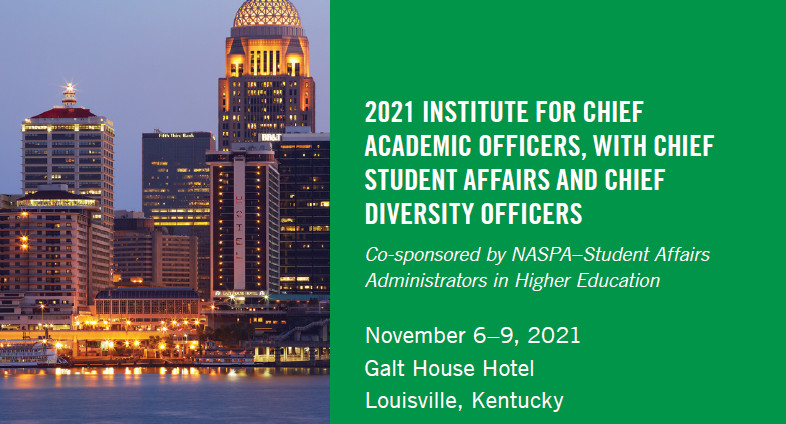How can chief academic, student affairs, and diversity officers work together more effectively to support students? And how can these leaders employ what they learned during the pandemic to reimagine an integrated and collaborative approach to the student learning experience? CIC’s 2021 Institute for Chief Academic Officers, with Chief Student Affairs and Chief Diversity Officers, will help participating teams address these and other essential questions.

The 2021 Institute, co-sponsored by NASPA–Student Affairs Administrators in Higher Education, will take place November 6–9 at the Galt House Hotel in Louisville, Kentucky. With the theme “Constructing the Future: Collaborating for Success,” the Institute will provide a framework for discussion of holistic strategies for increased student success.
During the first of four plenary sessions, Dan-el Padilla Peralta, associate professor of classics at Princeton University and author of Undocumented: A Dominican Boy’s Odyssey from a Homeless Shelter to the Ivy League (2015), will deliver the keynote address. His views on how to revitalize the humanities have sparked both academic and popular discussion and spurred debate about how classic texts and humanistic learning can best engage the full range of today’s students, preparing them for lives and careers in the years to come. His address will help campus leaders consider reforms that may be necessary to keep foundational disciplines strong—as well as provide a pathway to interesting questions about what is essential in higher education. In a follow-up panel, “Strengthening Humanities for a New Majority,” three chief academic officers, all distinguished humanists, will share their perspectives on how to revive broad interest in humanistic learning including specific initiatives working at their institutions.
Mental health is fundamental to student achievement and academic success. New research from plenary speaker Lindsay Till Hoyt, assistant professor of applied developmental psychology at Fordham University, has found that volunteering, voting, and activism—key elements of civic engagement—tend to be positively related to mental well-being and student success, with some important nuances. In her address, “Civic Engagement and Student Well-being,” Hoyt will share recent findings and discuss how her research can help campus leaders create thriving communities of learning that simultaneously support students’ mental well-being and prepare them for active and meaningful civic engagement.
In her plenary address “Promoting Equity and Quality in Student Engagement and Success,” Jillian Kinzie, associate director of the Indiana University Center for Postsecondary Research and the National Survey of Student Engagement (NSSE) Institute, will draw on results from NSSE, as well as new evidence about advising, sense of belonging, and career and workplace preparation, to encourage data-informed strategies and greater connection between data and action to improve educational quality for all students.
During the closing plenary, a panel of distinguished higher education leaders with experience driving strategic change will answer questions such as: What decisions do campuses face today that will most significantly shape their futures? And how can campus leaders collaborate to build a future focused on both student and institution success? The panelists include Eva Chatterjee-Sutton, vice president of student life and dean of students at Washington & Jefferson College (PA); Leanne M. Neilson, provost and vice president for academic affairs at California Lutheran University; and Monica M. Smith, vice president of diversity, equity, and inclusion at Augustana College (IL). Kevin Kruger, president of NASPA, will serve as moderator.
CAOs can choose to participate in the Workshop for New Academic Officers or the Workshop for CAOs in Their Third or Fourth Year of Service immediately preceding the Institute. And participants in all roles can choose to register for one of many workshops that will be offered on November 8.
Strong cooperation and seamless communication among chief officers will be necessary to develop effective partnerships, examine strategic planning and institutional practice through the lens of equity, and foster student success. Concurrent sessions will offer practical advice on such topics as building processes to support underprepared students’ success; integrating diversity, equity, and inclusion into campus life; maximizing student achievement and retention; and strategic academic review and realignment. In panels featuring campus teams, leaders will offer strategies on adapting living-learning communities to post- COVID-19 realities, supporting student mental health, expanding esports, and creating authentic communities. Outside experts will explore current legal issues, changes to Title IX, and how to leverage consortial collaborations.
After an extended time of canceled in-person events, CAOs have expressed a strong desire to connect, face-to-face, formally and informally with colleagues. The Institute will offer all the same opportunities past participants have enjoyed, with some necessary modifications for safety. This includes roundtable discussion groups, a welcome dinner, and various reunions, receptions, and small-group affinity meetings.
CIC President Marjorie Hass is eager to see CIC campus leaders together again in person. “The Institute for Chief Academic Officers has long been a powerful opportunity for candid conversations and the exchange of ideas and advice. I remember this from when I participated as provost of Muhlenberg College (PA). This year, when CAOs are joined by chief student affairs and chief diversity officers, the discussions will be even richer. This fall is the perfect time to send a campus team to be inspired to engage in the deeper collaboration campuses need to construct a more inclusive shared vision and to learn about important, practical applications to bring back to campus.”
J. Andrew Prall, vice president for academic affairs at Aurora University (IL) and chair of the CIC Chief Academic Officers Task Force, which plans the Institute, offered his reflections on coming back together: “It will be wonderful to reconnect in person with colleagues from around the country. I want to share my experiences from the past year and to discuss with others the ways academic and student affairs can collaborate for future success. I look forward to the Institute every year, but I think this year will be especially satisfying and worthwhile.”



